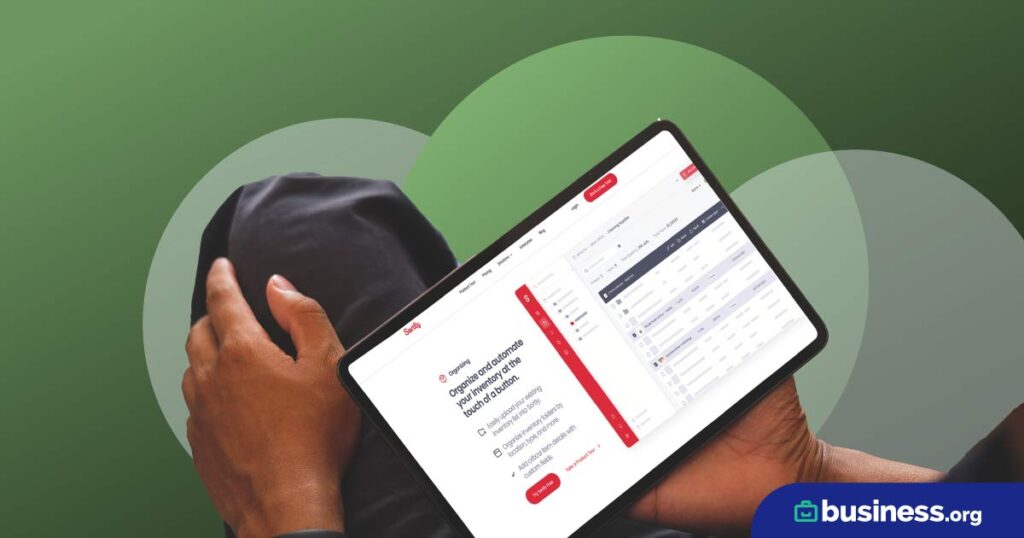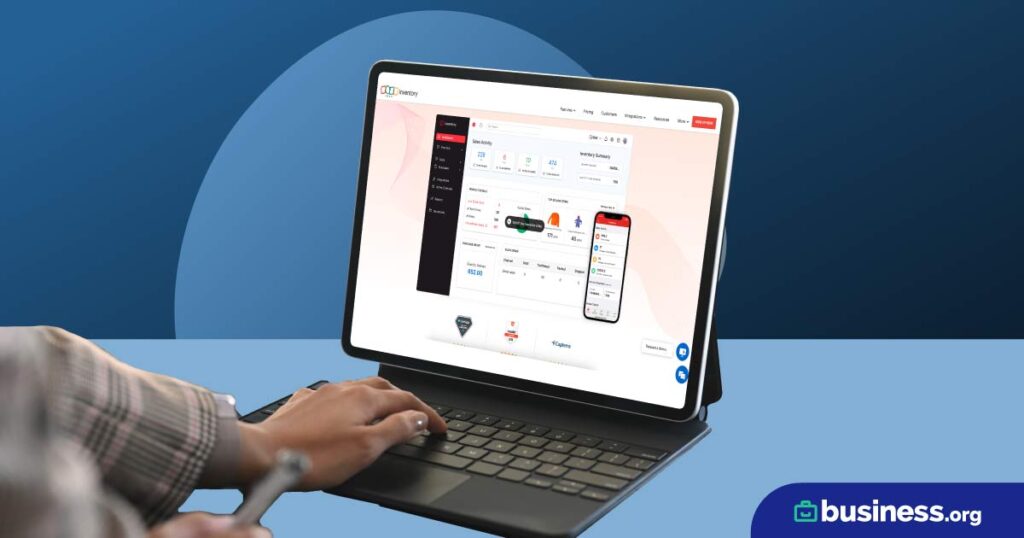We are committed to sharing unbiased reviews. Some of the links on our site are from our partners who compensate us. Read our editorial guidelines and advertising disclosure.
Zoho Inventory vs. QuickBooks Commerce
Data as of 8/15/22. Offers and availability may vary by location and are subject to change.
* Sales price for the first 3 months. QuickBooks Commerce must be paired with QuickBooks Online Essentials. The combined non-sales price is $105/mo.: $50/mo. for QuickBooks Commerce and $55/mo. for QuickBooks Online Essentials
If you own a growing business, you’re probably tracking a large amount of inventory across multiple locations and looking for a way to integrate with ecommerce. Here’s a simple answer to your problem: you can’t go wrong with Zoho Inventory. Its inventory management system is one of the best on the market. But what if you need something that tracks more than inventory and helps you with your accounting along the way? Well, that’s where QuickBooks Commerce comes in.
Which one is right for your business? Read on to find out.
Zoho Inventory vs QuickBooks Commerce Table of Contents
- : QuickBooks Commerce
- : Zoho Inventory
- : Tie
- : QuickBooks Commerce
- : Zoho Inventory
Top feature comparison
Let’s look at the top inventory management features for Zoho Inventory and QuickBooks Commerce to get a quick read on where each brand excels. Zoho Inventory is our pick for businesses that are growing and need to track everything, while QuickBooks Commerce is great for small businesses because of its built-in accounting.
Compare Zoho Inventory and QuickBooks Commerce top features
Data as of 8/15/22. Offers and availability may vary by location and are subject to change.
* Sales price for the first 3 months
Zoho Inventory and QuickBooks Commerce are very comparable from a bird’s eye view. Both are web apps with great inventory management tools for business owners. Plus, both of these brands are actually part of larger software families—Zoho includes customer relationship management (CRM), accounting, and more, while QuickBooks is primarily known for its accounting software. Because of that, they both work well with small and growing businesses and offer several types of business software beyond just inventory management:
- Accounting
- Integrations
- Inventory management
- Multichannel ecommerce
- Order management
- Reporting and analytics
At first glance, QuickBooks Commerce is a slightly better investment because it is part of the QuickBooks family. Zoho Inventory has a lot of sister applications—like finance, workplace, CRM, and HR bundles—but it’s not as popular as QuickBooks.
Zoho Inventory, on the other hand, is clearly a more affordable inventory management platform. It also has more plan options than QuickBooks. Add in inventory tracking features that are a tad better than QuickBooks, and Zoho becomes our top pick for small business inventory management in 2022.
So far it seems like a pretty even matchup, so let’s put Zoho Inventory and QuickBooks Commerce head-to-head in a few categories to see where they really end up.
By signing up I agree to the Terms of Use and Privacy Policy.
Best for accounting: QuickBooks Commerce
This is an easy one: QuickBooks Commerce is the best out there for accounting within an inventory management system because it is built around QuickBooks—you even need QuickBooks Online to run QuickBooks Commerce. That said, ecommerce accounting is a major feature of QuickBooks Commerce and includes bookkeeping across sales channels and inventory. It gives you automated invoicing and deeper organized tax categories right when you get your receipts.
As one of our top picks for accounting software this year, QuickBooks Online is a no-brainer if you’re looking for accounting software within your inventory management system. It tracks income and expenses, organizes receipts, manages invoices and payments, and helps you estimate your earnings. Plus, business owners can use it to automatically file taxes at the end of the year. You really can’t go wrong with QuickBooks.
The fact that QuickBooks Commerce is built around the QuickBooks Online system makes it more appealing for small-business owners because QuickBooks Commerce syncs with QuickBooks Online without an additional third-party integration. It doesn’t get much easier!
Now, QuickBooks Online does integrate with Zoho Inventory, and if you want to use QuickBooks Online for accounting and Zoho for inventory tracking, that is totally possible. However, you would be paying for two separate systems and still giving QuickBooks the edge here since you’re using its accounting platform. Although Zoho Inventory can work with Zoho Books for accounting and finance, when you have QuickBooks as an easy option, it’s best to go with that. Sometimes the simplest solution is best.
Best integrations: Zoho Inventory
With over 60 integrations and add-ons, Zoho Inventory is designed to make it easy to expand your business and reach. Here are some of the integrations with Zoho offers:
- Accounting (Zoho Books, QuickBooks Online)
- CRM (Zoho CRM)
- Marketplaces (Amazon, Etsy, eBay, Shopify)
- Payment gateways (Stripe, PayPal)
- Shipping carriers and tracking (Easypost, FedEx, UPS, DHL)
- Shopping carts (BigCommerce, WooCommerce)
- And more!
Honestly, with Zoho Inventory, the integration possibilities are endless! Add to that the family of Zoho products, and you’ve got a system that easily rivals QuickBooks for its integrations and expansion.
As we mentioned before, QuickBooks Commerce’s major integration is built-in: QuickBooks Online. That provides great accounting features and helps you keep up with payments, but what else does it offer? With its other integrations, QuickBooks Commerce covers:
- CRM (Prospect CRM)
- Forecasting (Inventory Planner, VeraCore)
- Marketing (HubSpot)
- Marketplaces (Amazon, eBay, Etsy, Shopify, WooCommerce)
- Shipping (Easy Ship, Fulfillment by Amazon, ShipStation)
- 3PLs (3PL Central, ShipBob)
- And more!
Although QuickBooks Commerce offers 32 integrations, Zoho Inventory has a curated list that powers—instead of overpowering—the main inventory management system. That’s the key with integrations, and it’s what Zoho does so well. With its comprehensive list of integrations, Zoho Inventory takes the cake. It expands the scope of the system without overwhelming the user.
Best for inventory tracking: Zoho Inventory
Zoho Inventory is the best at inventory tracking and management for small and growing businesses because of its flexibility. After all, there's no one-size-fits-all business model. From sales orders to order fulfillment and invoices, Zoho’s inventory tracking ensures that your inventory reports stay up to date. With Zoho, you can use serial numbers for your warehouse and barcode scanners in your stores—in short, keeping up with products in your supply chain is easy.
Zoho can also do things QuickBooks Commerce cannot do. Because QuickBooks Commerce is a new product, there are still a couple of kinks to work out. Zoho is flexible and starts out with 50 orders per month, but you can grow to unlimited orders, which works well for businesses that start out small and grow. QuickBooks, on the other hand, is not built to handle smaller businesses because it requires an inventory of at least 20,000 items and sales orders of at least 30,000 orders per month.
That limitation excludes small businesses that may not reach those numbers. Plus, QuickBooks Commerce does not allow dropshipping and is not great with serial number tracking. So that begs the question: what can QuickBooks Commerce do for your inventory? Well, it can help you track and fulfill orders across sales channels and locations, but not much else. Zoho is the clear winner here.
Best sales channel management: QuickBooks Commerce
With the ability to manage inventory and orders for all your sales channels efficiently and effortlessly, QuickBooks Commerce is the best for sales channel management. Through QuickBooks, you can sell on marketplaces, B2C and B2B ecommerce platforms, and even from a personalized B2B store with wholesale products. But the best part is how it all comes together.
QuickBooks Commerce brings your marketplaces, spreadsheets, and integrations into the app so you can view it all from a dashboard with inventory numbers and sales upfront. Plus, if you have any product updates—pricing, descriptions, etc.—you can do it from QuickBooks Commerce and know that it’ll be updated across all of your sales channels.
Now, Zoho Inventory is great at adding in sales channels and works directly with Amazon, eBay, Etsy, and Shopify for ecommerce integrations. And this was a really tough call, but QuickBooks Commerce is just a little bit better in this area. Here’s why.
Although it is possible to handle multichannel selling in a solitary inventory management application without integrations, we liked the way QuickBooks Commerce integrated fully into the platform and automatically updated inventory levels. We also found that QuickBooks Commerce was better at fulfilling orders and tracking payments across multiple sales channels.
Zoho Inventory plans and pricing for 2022
Data as of 8/15/22. Offers and availability may vary by location and are subject to change.
*With annual plan
º With shipping labels included
Zoho Inventory also offers a lot of options for a good price—plus it works online and with mobile devices. Like QuickBooks Commerce, it works with QuickBooks and provides easy ecommerce options.
But the biggest difference between QuickBooks and Zoho is the price and cascading order limits. Zoho is built on a five-plan model, so as your business grows, you can increase your monthly orders, users, warehouses, and Shopify stores. This can be great because you’re not rushing into an expensive plan too soon, but it does limit your options right out of the box.
QuickBooks Commerce is no longer a standalone product and requires a QuickBooks Online subscription. Although there are multiple QuickBooks Online subscriptions, there is only one QuickBooks Commerce option:
QuickBooks Commerce plans and pricing for 2022
Data as of 8/15/22. Offers and availability may vary by location and are subject to change.
* With special offer
º User limits are based on QuickBooks Online pairing
That singular option greatly limits the choices for business owners and backs them into a corner. Although the pricing is good—currently at $52.50 per month—the lack of expansive options leaves a lot to be desired. Also, QuickBooks Commerce only works with a QuickBooks Online subscription, which has three plans that can run an additional $27.50 to $100 per month (for their sales pricing):
QuickBooks Online plans and pricing for 2022
Data as of 8/15/22. Offers and availability may vary by location and are subject to change.
* With special offer
The pairing of QuickBooks Commerce with QuickBooks Online (the Essentials plan—Simple Start doesn't pair with QuickBooks Commerce) means that your inventory management software will start at $52.50 per month for the first three months before doubling in price. Refer to the special offer below.
QuickBooks Online—and QuickBooks Commerce—are 50% off for the first three months. That means instead of paying $105 per month for QuickBooks Online Essentials and QuickBooks Commerce, it's $52.50 per month total!
The pricing from both Zoho Inventory and QuickBooks Commerce is comparable, but the expanded options from Zoho Inventory make it a better choice for business owners. Instead of changing QuickBooks Online plans as their business grows, business owners have the opportunity to expand their reach with Zoho plans—going from 50 orders per month up to unlimited orders with multiple warehouses and five Shopify stores. That sort of versatility is unparalleled.
The takeaway
QuickBooks Commerce and Zoho Inventory are evenly matched as inventory management systems. But, looking at pricing, ecommerce, integrations, accounting, and inventory management features, Zoho Inventory wins this match. It brings a lot to the table as an affordable inventory tracking option and is a great choice for multichannel retail and growing businesses.
Being part of the Zoho family—with finance, workplace, CRM, and HR bundles—helps too, but even on its own, the strength of its core features and its great pricing and plans take it above QuickBooks Commerce. However, if you already use QuickBooks Online and love its interface, you might prefer QuickBooks Commerce—as long as you have more than 20,000 items in stock.
As a small-business owner, you know that your business needs the best, and we’re here to help you find it. But in the end, the choice is yours. If you can’t decide between either option, try them out! Zoho Inventory offers a free plan and 14-day free trial, and QuickBooks Commerce has a 30-day free trial. Either way, try it out before committing to an inventory management platform and see which one is for you.
If you’re still looking for the right inventory management system for your business, check out our top choices for 2022.
Related reading
Inventory Management FAQ
Does Zoho Books have inventory?
It does! In fact, the inventory arm of Zoho Books is Zoho Inventory. Zoho Books is part of the Zoho family, which includes many apps and nine distinct categories of software. Zoho Inventory is part of the finance category with Zoho Books, so you could get both in just one bundle!
Other Zoho bundles include:
- Sales & marketing
- Customer service
- Email & collaboration
- Finance
- Human resources
- IT & help desk
- Legal
- Business intelligence
- Custom solutions
How do I update stock in Zoho Inventory?
Zoho makes adding or updating stock super easy. Just enter the Zoho app, go to your inventory management dashboard to the Items module, choose the item you want to adjust, and click the Adjust Stock button. From there you can change the quantity or value of the item and update it across your inventory.
Zoho Inventory is a user-friendly experience with a very organized dashboard. The whole system makes it easy to keep track of your inventory across multiple locations.
Does Zoho Inventory integrate with QuickBooks?
It does. There is a QuickBooks Online integration with Zoho Inventory to make it easy for you to keep track of accounting and inventory from Zoho. With the integration, you can track sales and purchase orders from Zoho Inventory in QuickBooks. You can also export bills, credit notes, and invoices from Zoho to QuickBooks.
The integration does require a QuickBooks Online account to work.
The QuickBooks with Zoho Inventory integration is only available for the US edition of Zoho Inventory.
Does QuickBooks Commerce require QuickBooks Online?
Yes, QuickBooks Commerce must be paired with QuickBooks Online. You can choose any QuickBooks Online plan to use with QuickBooks Commerce and they work together to create a single platform for managing your business. QuickBooks Commerce does not work with QuickBooks Desktop.
TradeGecko, the original producers of QuickBooks Commerce as a standalone product, was acquired by Intuit in August 2020, and the standalone product will be retired on June 10, 2022. QuickBooks Commerce must be integrated with QuickBooks Online in order to work.
How do I install QuickBooks Commerce?
Once you have purchased a subscription to QuickBooks Online, you can log in to your account and add QuickBooks Commerce to your package. There is no need to download QuickBooks Commerce, as it’s an online application that works from your web browser.
However, there is an option to download the Essentials or Plus app to your Mac or Windows computer.
Methodology
We spent hours looking through pricing, features, integrations, and usability for Zoho Inventory and QuickBooks Commerce before coming up with our score for each platform. From there, we compared top features across both brands to see which one came out on top.
Disclaimer
At Business.org, our research is meant to offer general product and service recommendations. We don't guarantee that our suggestions will work best for each individual or business, so consider your unique needs when choosing products and services.







